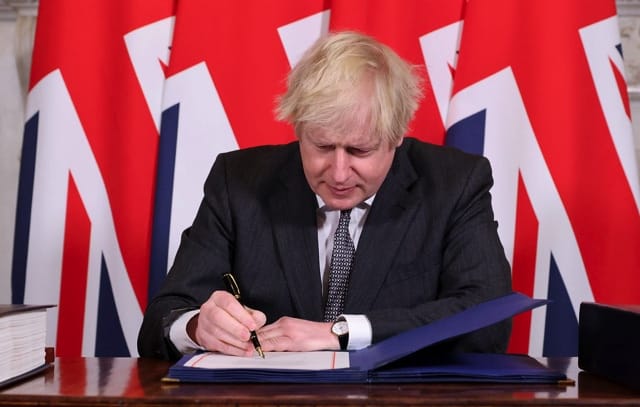The SOAS Spirit’s Brexit Round-Up

By Charlotte Paule, MSc Politics of Asia
We are back with our final Brexit update of this academic year, just 2 months after a trade deal was finally reached between the EU and UK.
“Much is still left up in the air amid the rush of getting the deal signed late last year. Problems within this hurried deal are now beginning to emerge.”
The transition period, during which the UK essentially enjoyed the same conditions as it did when it was part of the EU, formally ended on 31 December 2020. Although we are now in the post-transition period, much is still left up in the air amid the rush of getting the deal signed late last year. Problems within this hurried deal are now beginning to emerge.
In order to allow for the European Parliament and each EU member state to formally debate and ratify the deal, a temporary ‘provisional application’ was approved on 1 January. This was done to allow the EU ‘to conduct scrutiny and complete the conclusion process of the Agreements as diligently and smoothly as possible.’ This is a process that was wrapped up by the end of February.
However, February saw the EU request for more time to prepare ‘legally valid’ translations of the finalised deal into all 24 of its official languages. Speaking in February, a spokesman for the British government said, ‘it is disappointing the EU has not completed its internal processes in the agreed timeframe.’ The spokesman went on to say that ‘we have agreed to extend the deadline for the EU to ratify the deal until 30 April.’
On top of this delay, the impact of Brexit on trade is already being felt across industries in the UK. While the British government insisted on businesses facing no tariffs or obstacles in trade with the EU bloc, non-tariff trade barriers are still in place, especially in regards to the ‘rule-of-origin requirement’. This new rule places the burden on British businesses to prove that products being exported into the bloc originate from the UK. Failure to do so will result in being charged extra fees.
In January, the UHY Hacker Young group found that 20% of British small to medium sized enterprises stopped exporting goods to the EU completely to avoid the pallarver of new costs and additional paperwork.
The immediate aftermath of Brexit has also hit the service sector. Provisions for services are not included in the current trade deal. Analysts forecast that if a deal is not put in place, London, which is at the UK’s service secretary economy, may be set to lose up to £9.5bn in economic output a year.
The service sector, which encompases everything from law, finance, and fintech to hospitality and creative jobs, is responsible for approximately 80% of the UK’s economic output. For Sadiq Khan, London’s mayor, ‘the Government’s Brexit trade deal was the equivalent of a “no deal” Brexit for financial and professional services.’
The situation in Northern Ireland (NI) has also not been bettered, as border checks and controls have begun despite the government’s promise that there would not be a hard border between Ireland and NI. The European Research Group (ERG), led by Tory Brexiteers, have called on Boris Johnson to scrape the Northern Ireland Protocol altogether. They claim it has had a ‘profound and negative effect’. They are now calling for a triggering of Article 16 against the Protocol, which would allow the UK to unilaterally overrule it if it is found to create serious disruptions in Ireland or NI. The ERG joined the Irish Democratic Unionist Party, who also called for Article 16 to be triggered and for the UK to scrap the Protocol.
In her analysis, Sylvie Bermann, former French ambassador to the UK, Brexit will result in a bleaked Britain. She describes Boris Johnson as ‘an unrepentant and inveterate liar’, and considers the disillusionment of British people who hold on to a glorious, yet unrealistic, past as a root cause of Brexit.
Photo caption: Boris Johnson signs the Brexit trade deal in London on 30th December 2020. The EU has yet to ratify the deal, as it first has to go through the European Parliament and be ratified by the member states. (Andrew Parsons, No. 10 Downing Street)



